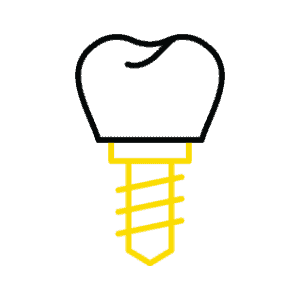
Dental Implants
Life Changing Dental Procedures From An Experienced Dental Team

Why Dental Implants?
Changing Lives One Smile At A Time
Dental implants are changing the way people live. They are designed to provide a foundation for replacement teeth which look, feel and function like natural teeth. This concept for oral rehabilitation was developed 40 years ago by a Swedish orthopedic surgeon, Dr. Per-Ingvar Brånemark. His pioneering research on the osseointegration of titanium dental implants has enabled millions of people world-wide to regain their comfort and self-confidence that was once lost to missing teeth.
What is a Dental Implant?
Dental Implant Materials
Many patients question what materials will be placed in their mouth. There are two main materials that make up dental implants.
Titanium: Surgical grade titanium is used because it has been established to integrate with our bone. Titanium is routinely used for knee and hip replacements and yields high success for tooth replacement.
Zirconia: A strong, biocompatible ceramic material, providing patients with a more natural esthetic. Zirconia’s capability as a long term implant option has continued to improve as developments in its manufacturing processes have occurred.
Are You A Candidate For Dental Implants?
To determine if you are a candidate for dental implants, our surgeons must first see you for an initial consultation and oral examination. The purpose of the initial consultation is for our team to review your medical and dental history and evaluate your current dental condition. Only then can our team determine if you are a candidate for dental implants.
For some patients, the current state of their mouth may not be ideal for placing dental implants. For example, some patients have suffered from extreme bone loss and they do not have enough bone for the implant to be placed securely. In that case, our doctors may recommend additional treatment, such as bone grafting. In order to provide the dental implants with the highest chance for success, they must have a strong foundation. To learn more about the long term effects of bone loss, please visit our Bone Grafting page.
Feel Confident & Prepared For Your Dental Implant Procedure
Choosing The Right Doctor
How to Pick the Right Implant Doctor
The Following are some questions you might ask your Doctor to see if they are qualified for your needs:
- How long have you been placing implants?
- How many implants do you place per year?
- Do they have a CAT scan machine?
- Do they utilize PRP or L-PRF in their procedures?
- Ask your doctor to see results of their procedures.
The Initial Consultation & Oral Examination
- Your referral slip from your general dentist (if you have been referred to our office by a general dentist)
- Any X-rays that were taken within the past year
- A list of any medications that you are currently taking
- Your insurance card
Our oral surgeons will evaluate your condition, determine your diagnosis and then explain your treatment options to you. If you are a candidate for dental implants, our surgeons will discuss the process for placing dental implants and inform you of the types of prosthesis best suited for your situation.
Dental Implants: A Collaborative Effort
Implants are a collaborative effort between our surgeons and your general dentist. Our surgeons will perform the implant surgery, initial tooth extractions and bone grafting if necessary. Your general dentist will fabricate the temporary and permanent prosthesis (crown, denture or bridge).
We understand some patients do not have a general dentist that they see on a regular basis. Our team works closely with several highly qualified general dentists in the Triangle area and we will be happy to refer you to the right dentist based on your needs and desired location.
The Day of Your Surgery: What You Can Expect
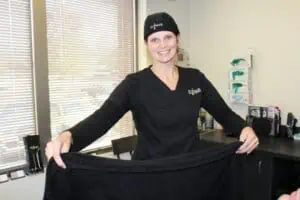
When You Arrive At Our Office
We will begin by giving you a warm blanket as we make you comfortable in our operating suite. In most cases, IV sedation and/or local anesthesia are administered to the patient by one of our trained staff prior to the surgical procedure. If you are receiving IV sedation, numbing cream can be used for painless administration.
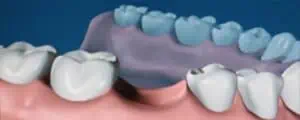
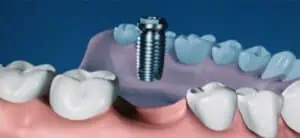
The Surgical Procedure
If you have chosen to be sedated for this appointment, our surgeons will start the IV in addition to delivering the local anesthetic. First, a small incision will be made into the gum tissue to expose the underlying area where the implant will be placed.
Then, using special dental implant tools, our surgeons will create a space for the implant to be inserted. In most cases, a healing cap is placed on top of the implant. Then Sutures are used to ensure the tissue heals properly around the implant.
Selecting the Best Prosthesis
Which Prosthesis is Best for Your Case?
Deciding to get dental implants is a life changing decision! You are choosing to take action to regain your dental health and restore the beautiful smile you once enjoyed. Now that the decision is made it is time to consider what type of dental prosthesis is right for your needs. A prosthesis is the new dental restoration attached to the implants and there are several different types you can choose from. After your examination our team will discuss all the options best suited to your case and help you to make the best decision.
Types of Dental Prosthesis:
The surgeon will recommend the number of implants you will need depending upon the type of complete prosthetic you are getting. A fixed bridge prosthesis – permanent tooth replacement – is recommended for patients who have lost all their teeth but have not suffered extensive bone loss in the jaw. The doctor may recommend an overdenture if you have lost a significant amount of the bone needed for face/lip support. This type of prosthesis fits over the implants rather than being permanently attached.
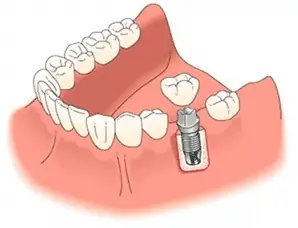
Crown: A single prosthetic device used to replace an individual tooth. Every prosthetic tooth is securely attached to a single implant.
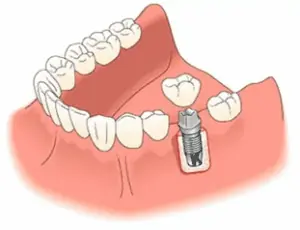
Partial Prosthesis: Sometimes called a fixed bridge, this type of prosthetic device can replace several teeth and may only require one or two implants.
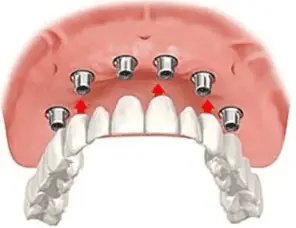
Complete Dental Prosthesis: A complete dental prosthesis is used to replace every tooth in the upper or lower jaw.
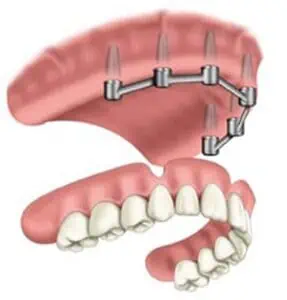
Complete Prosthesis, (removable): Also called an overdenture, this type of prosthetic attaches to a bar or ball-in-socket attachments.
A BETTER Option: Overdentures
Overdentures are becoming a popular alternative to conventional dentures.
The benefits of overdentures include:
- Restores 60% of functionality
- Provides lip support
- Supports bone which minimizes chronic and acute pain
- Implant-stabilized retention reduces movement along the ridge therefore preventing sore spots
- NO denture adhesive necessary
- Inexpensive
Types Of Overdentures
Overdentures have revolutionized world of removable prostheses. Today, there are two types of overdentures available: Ball-and-Socket and Bar-and-Clip.
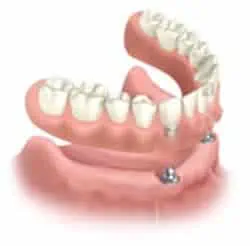
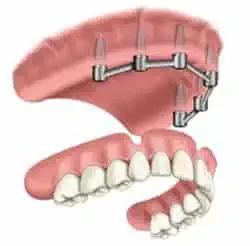
Traditional Dentures
Click here to learn more about dentures and if they’re a good fit for your smile.
Glossary of Dental Implant Terminology
Here are a few of the terms you might encounter during your visit to Nu Image Surgical and Dental Implant Center. Please refer to the list and if you have any questions or need further explanation about your procedure, please call our offices in Raleigh, Wake Forest, Brier Creek, Cary or Holly Springs. We’ll be happy to answer any questions you may have.
- Abutment – sits between the implant and the prosthetic teeth, it is held in place by the abutment screw
- Cap – also called a crown, a permanent prosthetic tooth attached to an implant
- Dental Implant – a titanium rod that is implanted into the jaw. One prosthetic tooth replacement is then attached to each implant.
- Edentulism – a patient with no teeth is said to have edentulism
- Immediate Loading – a procedure whereby patients receive implants and dental prosthesis during the same visit.
- Overdenture – traditional dentures that attach to dental implants. Overdentures are removable and attach to the implants with a bar or ball attachments.
- Dental Prosthesis – a temporary or permanent replacement for teeth. They may be placed on top of your teeth or replace lost teeth entirely.
- Titanium – the metal used to make dental implants. It is ideal for dental applications because it is non corroding, soft and lightweight.
- Two-stage Implants – implants that require two office visits to complete tooth restoration. The implants are covered by gum tissue immediately after being placed in the jaw.
- Bone Graft – bone tissue used to replace lost bone in the jaw as part of the dental implantation process. The patient’s bone tissue or bone from a tissue bank may be used. Sometimes grafts are necessary to strengthen the jaw for implants to hold securely.
Advancements in Dental Implant Technology
At Nu Image, we believe in providing our patients with the most advanced dental implant treatment. We have integrated the latest equipment and materials into our state-of-the-art facility. With the technology that is available today, dental implants have now become a viable option for almost any patient.
CT Scans Have Never Been Easier
Here at Nu Image Surgical, we use the Planmeca ProMax® 3D unit which offers a unique Planmeca Ultra Low Dose™ imaging protocol. This enables CBCT imaging with an even lower effective patient dose than standard 2D panoramic imaging.
Benefits:
- It’s convenient. Having a dental CBCT scan taken at our office is more convenient than having one taken at the hospital.
- It’s quick. The Planmeca CBCT unit only takes 20 seconds to complete one scan.
- It’s more affordable. Having a dental CBCT scan at our office costs less than having the same image taken at the hospital.
- Less radiation emitted. Taking a CBCT scan with Planmeca Ultra Low Dose™ imaging protocol, patients are exposed to less than half of the normal radiation emitted while having a full set of standard, dental x-rays.
This technology enables the detection and evaluation of problems before they become serious. Our surgeons can accurately measure bone and jaw deformities, assess bone lesions and changes of the jaw, and detect other pathologies, such as cysts, tumors, and disease.
Surgical Guides
Guided dental implant surgery is an innovative dental procedure utilizing new digital technology which provides a precise and efficient method to place dental implants quickly, comfortably, and accurately. With guided implant surgery, the surgeon maps out the entire procedure virtually using 3-D images and a computerized model of the patient’s mouth. This is utilized to develop a digital treatment plan in which the exact position of the dental implant is determined in advance of treatment. In this way, we can see all aspects of dental implant surgery before it ever actually happens.
Guided surgery allows us to perform with the highest level of precision and control and can be invaluable depending on the complexity of the case and the anatomy of the patient. Additionally, this gives your general dentist the best restorative options for getting you the best aesthetic result.
3-D Printers
As the leading dental implant practice in the triangle, Nu Image Surgical utilizes a 3-D printing technology for dental implant placement. With this advanced scanning technology, exact replicas can be made of a patient’s jaw and teeth. By having such precise replicas to work with, dental implants can be designed to fit better, look better, and work better than ever before for each patient.
With 3-D printing, we know that the printed object has been precisely crafted and specially engineered for the unique needs of each individual patient.
Learn More
To learn more about our facility, equipment and materials, please follow the links below:

